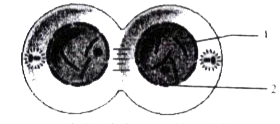Name the event during cell division that results in the gain or loss of chromosome.
Step-by-Step Solution:
1. Understanding Cell Division: Cell division is the process by which a parent cell divides into two daughter cells. This process involves several stages, including metaphase and anaphase.
2. Metaphase: During metaphase, chromosomes align in a straight line at the cell's equatorial plane. This alignment is crucial for the proper segregation of chromosomes.
3. Anaphase: Following metaphase, the cell enters anaphase, where sister chromatids are supposed to separate and move towards opposite poles of the cell.
4. Non-Disjunction: Non-disjunction is the event that can occur during anaphase. It refers to the failure of sister chromatids to separate properly. Instead of moving to opposite poles, they may remain attached.
5. Consequences of Non-Disjunction: When non-disjunction occurs, it can lead to aneuploidy, which is a condition characterized by an abnormal number of chromosomes. This can result in either a gain (trisomy) or loss (monosomy) of chromosomes in the daughter cells.
6. Examples of Aneuploidy:
- Gain of Chromosomes: An example is Down syndrome, which is caused by trisomy of chromosome 21 (an extra copy of chromosome 21).
- Loss of Chromosomes: An example is Turner syndrome, which occurs when there is a loss of one X chromosome in females (monosomy).
7. Final Answer: The event during cell division that results in the gain or loss of chromosomes is called non-disjunction, which leads to a condition known as aneuploidy.
---
- Gain of Chromosomes: An example is Down syndrome, which is caused by trisomy of chromosome 21 (an extra copy of chromosome 21).
- Loss of Chromosomes: An example is Turner syndrome, which occurs when there is a loss of one X chromosome in females (monosomy).
Topper's Solved these Questions
- GENETICS AND EVOLUTION BOOK - TRUEMEN BIOLOGY ENGLISHCHAPTER - GENETICS AND EVOLUTION EXERCISE - SECTION-B
38 Videos
- GENETICS AND EVOLUTION BOOK - TRUEMEN BIOLOGY ENGLISHCHAPTER - GENETICS AND EVOLUTION EXERCISE - SECTION-C
45 Videos
- GeneticsBOOK - TRUEMEN BIOLOGY ENGLISHCHAPTER - GeneticsEXERCISE - ASSERTION AND REASON
122 Videos
- HUMAN HEALTH AND DISEASEBOOK - TRUEMEN BIOLOGY ENGLISHCHAPTER - HUMAN HEALTH AND DISEASEEXERCISE - MULTIPLE CHOICE QUESTIONS
209 Videos
Similar Questions
Name the event during cell divison cycle that results in the gain or loss of chromosome.
View SolutionStudy the diagram given below which represents a stage during the mitotic cell division and answer the questions that follow:

Which is the cell division that results in half the number of chromosomes in daughter cells?
View Solution
Knowledge Check
Failure of segregation of chromatids during cell division results in the gain or loss of chromososmes, this is called as
AeuploidyBmonoploidyCaneuploidyDpolyploidyFailure of cytokinesis after telophase stage of cell division results in an increase in a whole set of chromosomes in an organism. The phenomenon is called as
ApolyploidyBaneuploidyChaploidyDdiploidy
Amitosis occurs during cell division in
View SolutionDuring cell division, spindle fibers attach to which part of chromosome :-
View SolutionGain or loss of chromosome (s) is called
View SolutionName the stage of cell division where segregation of an independent pair of chromosomes occurs.
View SolutionName the stange of cell division where segregation of an independent pair of chromosomes occurs.
View SolutionIn cell division, cell plate is formed during
View Solution
